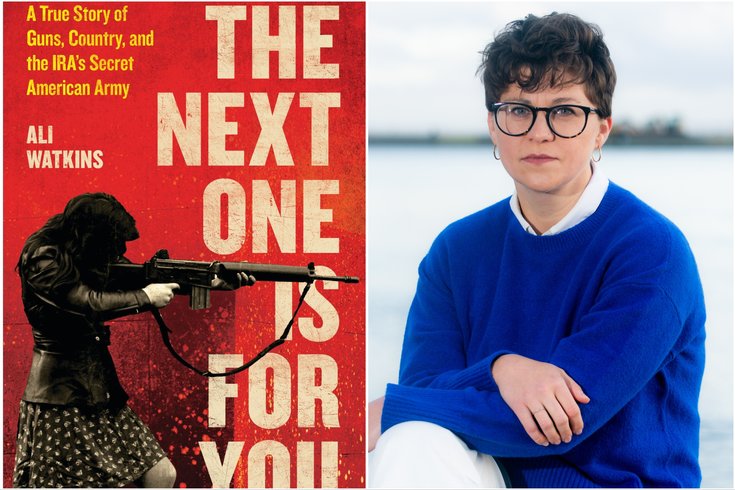
March 07, 2025
 Provided images/Hachette Book Group/Reg Gordon
Provided images/Hachette Book Group/Reg Gordon
New York Times reporter Ali Watkins wrote 'The Next One Is For You' while digging through her family's own murky history with the Irish Republican Army.
Ali Watkins had always heard vague, mysterious stories about her great-grandfather. She knew he left Northern Ireland for Philadelphia in 1922, immigrating under suspicious circumstances. Her family guessed he had fled over involvement with the Irish Republican Army. But she didn't know much more, and neither, it seemed, did anyone else.
So the Berks County native and current New York Times reporter tapped into her journalistic training. She started investigated, digging into the robust Irish American community in Philly. Idle web surfing one day led her to a curveball. Watkins had stumbled upon a 1975 federal case involving five Philadelphia-area men accused of running guns to the IRA during the most violent period of the Troubles, the three-decade conflict that killed thousands in Ireland.
"I thought that I understood a lot about Irish Philadelphia or knew a lot about it," the Temple alum said. "And then the fact that this existed, and I hadn't ever heard of it before, was just an indicator to me as a writer and a storyteller that there's something here that I'm not seeing and there's a black box in here somewhere that I haven't found."
Watkins chronicles the stateside effort to smuggle guns to the IRA in "The Next One Is For You," her debut book out Tuesday. While the operation spanned several states with robust Irish American populations, Philadelphia was a hotbed of illicit activity. European investigators connected nearly 200 instances of violence in Northern Ireland to guns procured in Philly and shipped overseas. The most committed runners in the region were linked to 378 rifles.
The smuggling started through Clan na Gael, an Irish American nationalist organization that dates back to the 1800s. It had sent guns and an estimated $100,000 to the Irish rebels during the Easter Rising of 1916, an insurrection against English rule. The Philly-based leader of Clan na Gael, Joseph McGarrity, continued running arms to his homeland even after the Irish War of Independence ended in 1921 with a treaty that divided the six counties of Northern Ireland into a separate, British country from the Republic of Ireland.
Though peace ostensibly reigned on the island, tensions continued to simmer between Republicans, who favored one united Ireland free of British control, and Loyalists, who wanted Northern Ireland to remain part of Great Britain. The conflict exploded into the Troubles in 1969, a period of violence that lasted until 1998 and spurred the longest continuous deployment of British troops in history.
Clan na Gael had weakened by that time, but some of its associates helped form a new and shadier outfit.
The Irish Northern Aid Committee, or NORAID, presented itself as a charitable U.S. organization that provided humanitarian relief to Irish families impacted by the Troubles. Secretly, it was buying and shipping arms, hidden in the cargo of airplanes and the Queen Elizabeth II passenger ship by sympathetic handlers. The leaders of this network were largely first-generation immigrants from Northern Ireland, where the violence between the IRA, British soldiers and paramilitaries loyal to the English erupted. Many had made new homes for themselves in Philadelphia, the U.S. city that Watkins argues held the "most aggressively Irish" community of expats.
"I do think some of it is just the character of the city," she said. "It's always been this kind of petulant place that's always had this underdog inferiority complex. You know, it's Boston's too loud, and New York's too big and D.C.'s too powerful, and you forget us on the 95 corridor. I think that really fortifies people who are of Philadelphia or who land in Philadelphia. And I do think that's probably why this community evolved the way it did in Philly."
The book traces the path of one of the guns that came from the city, an ArmaLite assault rifle. Watkins describes both the people who bought it and the teenage IRA volunteer who eventually used it, providing context on what drew each of them to the conflict. She also introduces new characters as the story progresses — including the federal agents who began surveilling the gun smugglers in the United States and prosecutors who sent a few to prison.
Watkins spoke with the families of some of the scheme's ringleaders — including Dan Duffy, Vincent Conlon and Danny Cahalane, three of the "Philadelphia Five" from the 1975 case. She also tracked down the court records of the trial, buried in two banker boxes in an archive warehouse in Northeast Philadelphia. (After no one in the building took her calls, Watkins showed up one day "yelling into the microphone" at the security gate until someone answered.) Making headway in Ireland was considerably more difficult, though Watkins' relocation there in 2022 helped. She has lived abroad ever since, splitting her time between Northern Ireland and Galway.
The book's chilling title is a quote lifted from a note stuffed in Duffy's mailbox around the time of his indictment. The anonymous sender had left a loose bullet with it. Watkins felt the line captured the paranoia on all sides of the conflict, as well as the ominous atmosphere of the story. It also didn't pose the same problems as her original title, "The Boys from Philly." Watkins' publishing team worried readers would assume it was a book about the Eagles.
Any history of the Troubles, a sectarian conflict that inspires strong feelings to this day, is difficult to synthesize. One examining American involvement is no exception. But by drawing a direct line from an assault weapon supplied by the "boys from Philly" to a young soldier an ocean away, Watkins attempted to simplify an incredibly complicated and contentious story.
"I think when you think of these really big geopolitical conflicts, it almost feels too big for people to get their arms around," she said. "And I was intimidated by it, too. But when you boil down so many of these things, it's about a gun and it's about the people on either side of that gun.
"I think it's a valuable way to think about any conflict. Beneath all of the heady rhetoric and geopolitics we're talking about guns hurting people."
Follow Kristin & PhillyVoice on Twitter: @kristin_hunt
| @thePhillyVoice
Like us on Facebook: PhillyVoice
Have a news tip? Let us know.